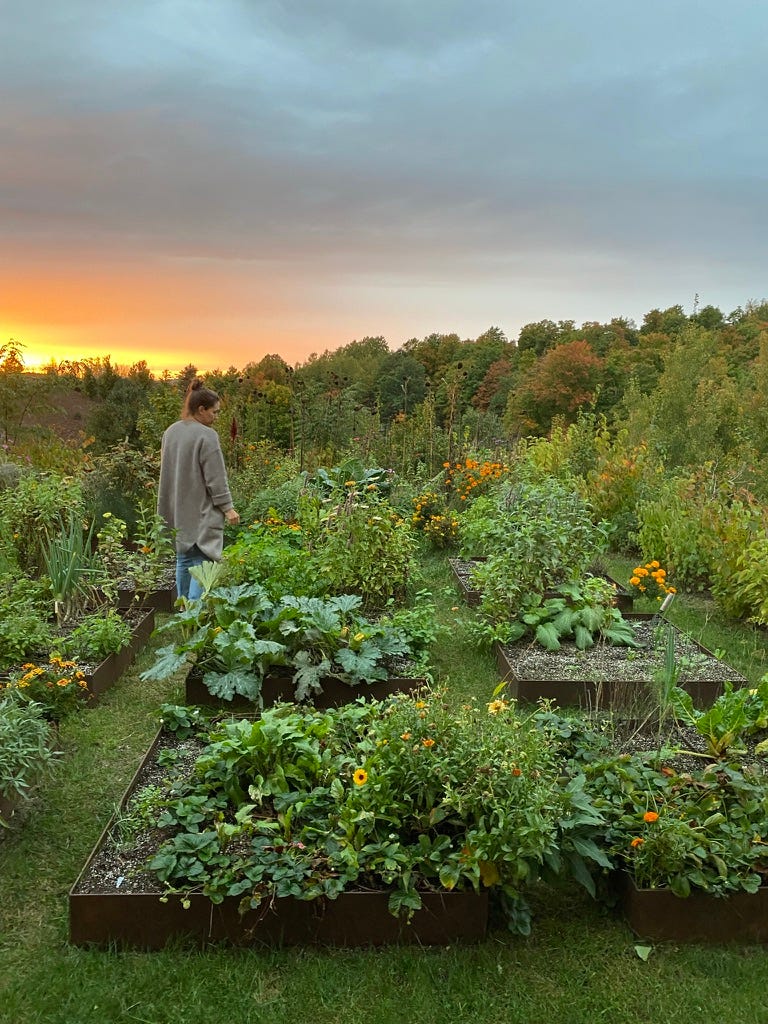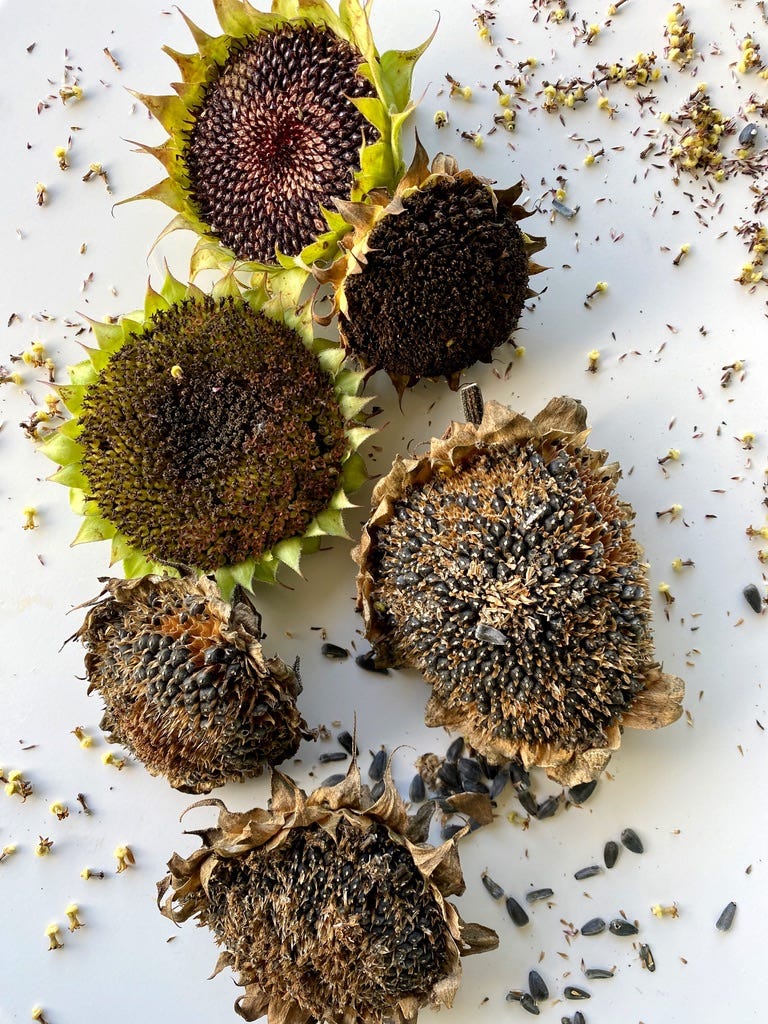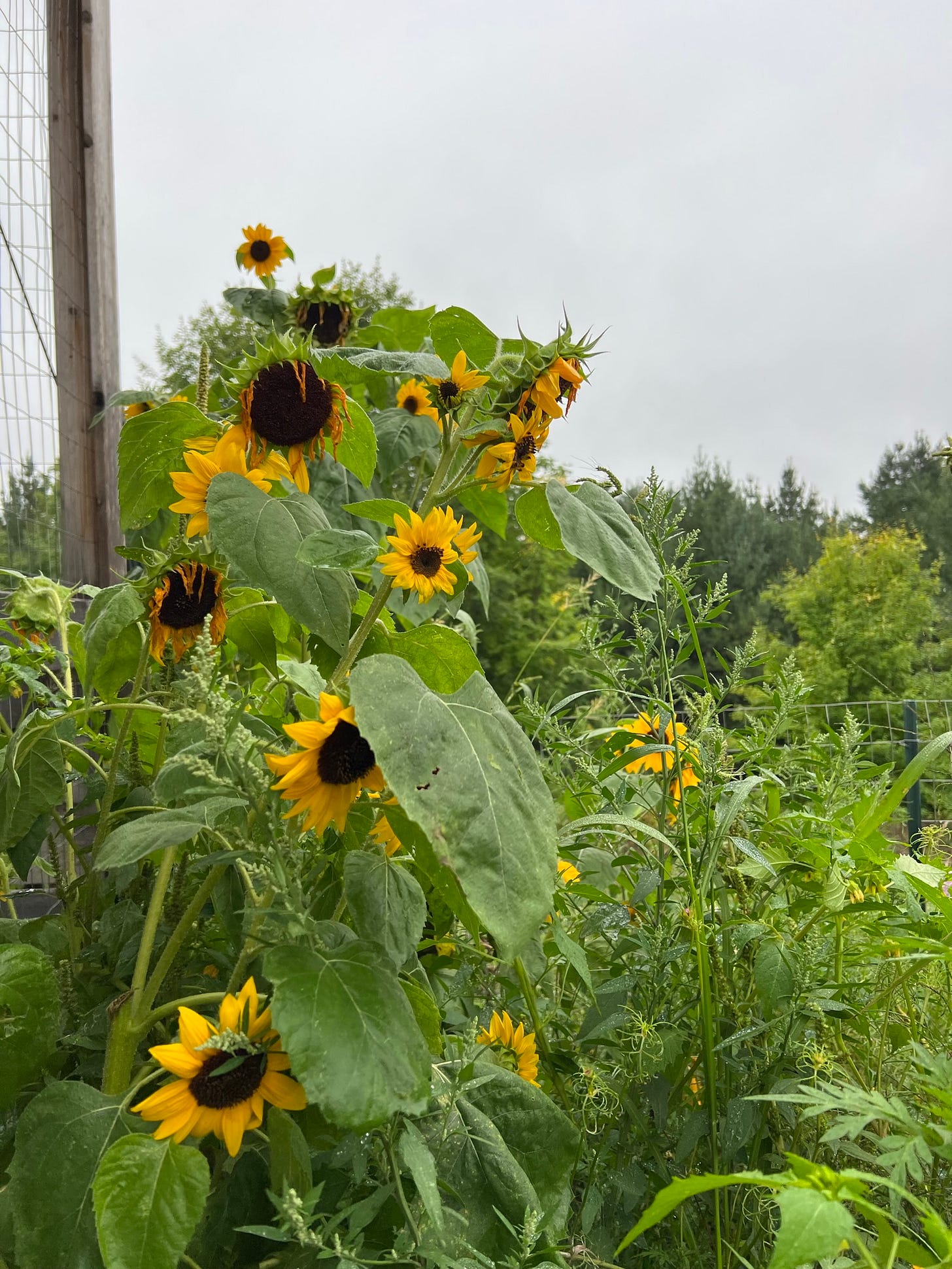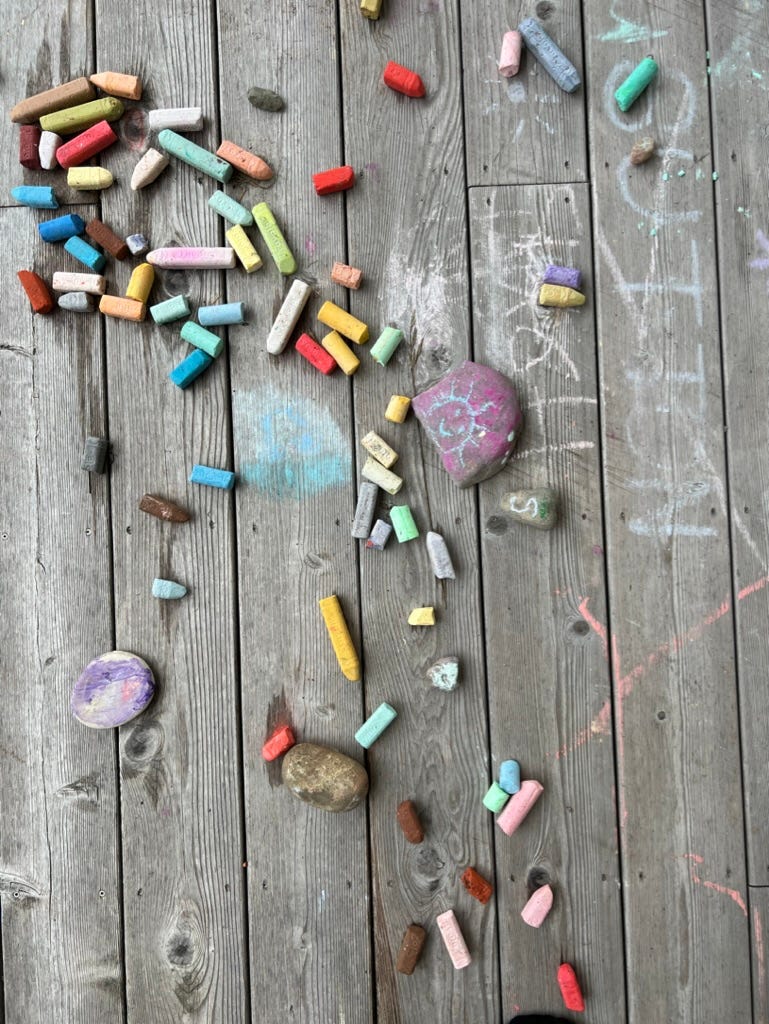Fading Into New Life
It isn't easy to let summer's abundance go, but it can lead to the new and unexpected
I wake bleary-eyed, still trying to let my eyes adjust to the blue light that crests before the sun comes over the hill. The cool air blows over us through the cracked windows, and it speaks of the shifting light and seasons. The dew clings to the edges of the plants just as it does to the windows’ glass. As the sunrises on the east side of the house, the quiet drip-drip of the melting dew pulls me from the bed as the light streams warm orange and pink into the room. Fog will soon rise from the valleys as the dew burns off the fields and forests around us.
As we walk down to begin making coffee, I open the door to the garden and watch as the geese fly in a formed V south and honk their farewells. The air is cold. The field grasses lay heavy and flattened by the condensation that formed as the cool air came in on a still, warm swath of land. The bees cling to the pillows of Marigolds where they stayed the night and, just like me, do not want to push themselves to awaken anywhere near as early as they did in July. Even if only a few months ago, those warm mornings feel like a distant memory that may simply now be out of reach for a while, so I embrace my wool clogs for a wander to the porch.
Standing on the porch watching the fog rise while the hum of the hot water pot comes to a boil for coffee, the chipmunks scamper to the compost bucket that’s overdue to go to the chickens. It contains corn cobs, tomato cores, hazelnut shells, and watermelon rinds. A feast given from the end of the summer. The chipmunks are braver these days and sneak up to the porch for a scrap. We sit near eye-to-eye because their fear of impending winter is greater than me. Just weeks ago, they were sneakier and came at night because, for just a moment, the warm days felt somewhat infinite, but now they feel as if we are living on borrowed time. We suddenly feel closer to the frost than to a warm day, only cooled by the lake's freshwater.
I watch the black squirrel who has staked a claim on our garden scramble up a branching sunflower and snip off a drooping sunflower head. I sip my coffee now, watching him as I am sure they think they got away without anyone noticing. The blue jays and the finches dance over the sunflowers, and just this week, the chickadees joined in the fun. The sunflowers in August shone as bright as the sun in the sky, with their warm faces chasing wherever the sun moved. Now they droop over. I used to be saddened by their shift from bright blooms to these drooped, downward-facing heads. Instead, I have learned that the bloom is only the beginning, and the flopped petalless head is the ultimate goal of the sunflower. So I sit, marveling at the way the birds see the same. The bloom fed pollinators; now, the seeds feed the birds. Even in their fading, they still give life.
The older I get, the more I find the fading of summer a gift. Summer has many correlations to our lives. The full moon is equal to summer in life. Summer is equal to the time of day, from 12 p.m. to 4 p.m. The sun begins high in the sky and ends lower in each day. September acts as the transition from mid-day to early evening. If you have children, you know this time is full of emotions and activity that transits us from one point in the day to another. Then we arrive in the fall and enjoy the dinner hour of the year. Really, it is the time in the day from 4-7 p.m. It is still full of life, but the light is warmer and fading, preparing us for rest and rejuvenation. During this time of day/year, we gather together, feast, clean up what needs discarding, and embrace the shifting pace. The plants connect with this. They feel this too, and the sunflowers fading to feed the birds feel as if the fading should be celebrated just as we do when we gather together for dinners and routines settle in.
As humans, we struggle to celebrate the fading of life and seasons. We struggle with watching ourselves age and fade. There are entire industries designed to keep us from fading. We know what fading means…winter, death, fallow time, hibernation, a lack of life. I sit holding that sadness, watching September begin to transition to fall, but I also see and am already feeling the gift of the changing light, the shedding of old things to welcome new, and the way fallow can be a reset for rest and rejuvenation rather than loss and loneliness. Nature gives us the playbook if we listen closely enough. Nothing in nature ever fades without purpose or intent and it always leads to new life.
Summer's final days aren't easy to swallow. We don't like the feeling of watching the potato plant die away that once bloomed purple blossoms in the heat of summer, but when they die and shrivel...it tells us something. Just beneath the surface of the soil, under those dried stalks, lies sustenance to continue on with life. I think about that as I watch the sunflowers with my warm coffee and listen to my children’s pitter-patters around the house, breaking the silence and scaring the birds. As the sunflowers’ heads droop as if crying at summer's end, they feed new life from the abundance that summer allowed it to produce. Instead of holding too tightly to this season of warmth and light, it has opened itself to giving life to the next thing ahead of it. I begin to wonder what has summer allowed me to grow that I myself can use to build something new?
The chapters of life come and go. They fade away. The pen dries on a page, and we begin again, blank and new. Everything has its moment and time. Sometimes, that is a relationship. Sometimes, that is a career or job. Sometimes, that is a role of caring for someone you love. Sometimes, it is a place we call home. Sometimes, it is even ourselves. The beauty of watching the garden year after year fade back into the soil after it has given its time fully without abandon is that we can learn to accept these things repeatedly. We can watch as nature teaches us that even if it is sad to fade or change or transition, part of living is letting go but leaving behind the ability to spring new life into the world right behind us.
Deep in these thoughts on summer, my thoughts are broken by growing feet scampering to the porch to find my arms and warmth. The chill is crisp in my nose, and my not-so-little-any-more-children climb onto my lap as I hold my coffee away from spill territory. The birds rise up into the sky from their morning feast on the sunflowers. Holding this moment in my own summer of life, watching the garden shift itself, I cannot help but ask how I can better hold this summer of my life in a way that ensures the seeds it will leave behind may root and flourish into something even more beautiful than even this. I sit there feeling the weight of these souls who changed my life and brought me closer to who I am meant to be, and I wonder if the seeds I leave behind in them may be just like the seeds the sunflower leaves after summer. Maybe if I live my own summer of life well, it will bring one of the most vibrant falls behind it.
The sun eventually finds us on the porch that morning, and I sit in deep gratitude for all the life summer has given, even if not everything was checked off the bucket list. I thank the sunflower and the fields around us for helping me find peace in transitioning from one season to another. I thank them for reminding me that fall and the darker days aren’t meant to be anything but a time for grounding, letting go, tending to the roots, and finding a place for new growth. I feel that deeply, so I mentally begin to gather the seeds summer has allowed me to produce. I consider what I will spend the coming season letting go to make space for new growth.












